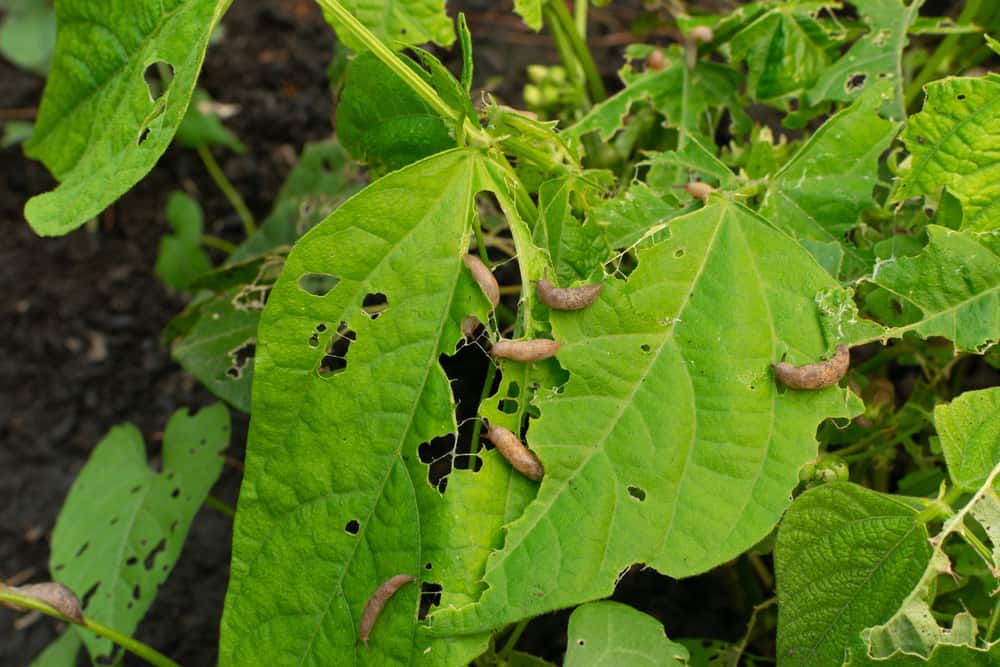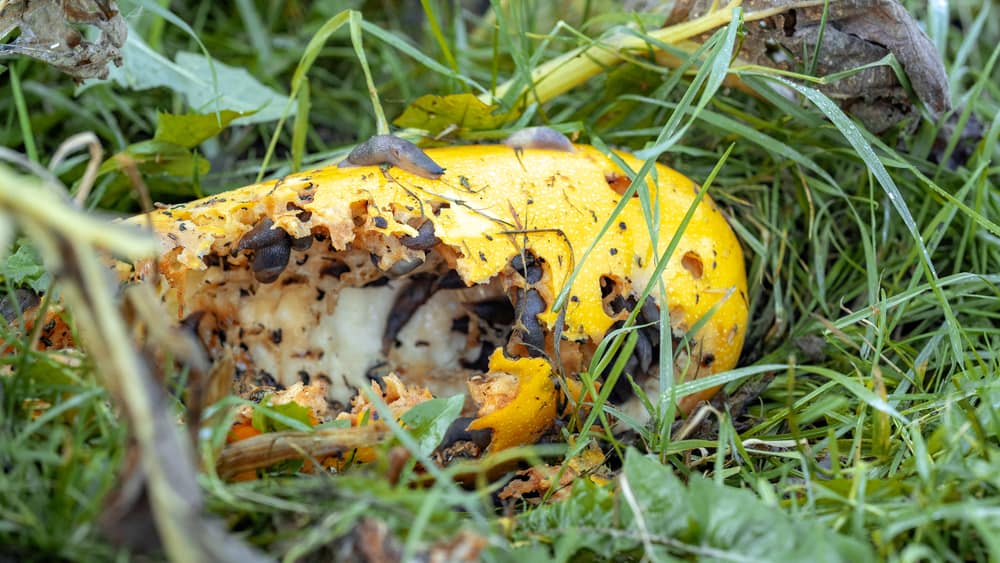When you think about summer and gardening projects, it is only a matter of time until you start thinking about slugs. They always seem to be around whenever we are outside, yet we know very little about these remarkable animals. Seeing slugs happily moving around in your yard might make you wonder what do slugs eat.
Slug Habits and Biology
The term slug refers to any terrestrial gastropod mollusk that doesn’t have a shell. Although they prefer humid or moist environments, amazingly, these animals can survive in almost any habitat on earth, which includes freshwater and saltwater habitats. Slugs are similar to snails; however, since they don’t have a shell, they can be more vulnerable to dry and hot conditions.
Slugs are hermaphrodites, which means that a slug has both female and male organs in its body. The organs for reproduction are located near the top of a slug’s body. Two slugs will simultaneously fertilize each other. When the time comes, it is most common for a slug to lay its eggs under the ground, but you can find slugs that are ovoviviparous, which means they will give birth to live offspring.
A slug’s body has four primary parts: the foot, the tail, the neck, and the head. The only difference between a slug’s body and the body of a snail is that snails have a fifth part which is called the visceral hump meaning the shell. Since slugs don’t have a shell, they have a mantle covering most of their back to keep their internal organs safe. In addition, slugs have four tentacles that are found in pairs of two. One pair carries the eyes, and the other carries the organs used for smell.
Interestingly, slugs have a rough tongue that is named a radula. It is an organ that can be compared to a file that is filled with horns. Slugs use this radula to rasp at food and scrape the food in their mouths. In addition, their chitin teeth help to break down the food. Mucus is secreted from a gland that is found on a slug’s muscular foot. This mucus helps the slug move around, which is why we often notice a slime trail when we see slugs.
What Do Slugs Like to Eat Most?
Since there are sea slugs and land slugs, their diet will differ depending on where they live and what type of slug they are. Slugs eat plants or fungi most typically, although there are predatory slugs and will feed on organisms.
Slugs aren’t picky eaters, and they will consume the most digestible matter that crosses their paths. Their preferred foods are:
- Leaves – Slugs will usually enjoy leaves that have fallen from trees and are easy to swallow.
- Grass – Slugs will eat grass if there is nothing more interesting around since grass is easily accessible.
- Fruit – Slugs love eating fruit, but they usually require quite a bit of effort. Therefore, fallen fruit is the perfect delicacy for slugs.
- Vegetables – Slugs love eating vegetables, especially low-hanging vegetables or root vegetables. It is not uncommon to find many slugs in your vegetable patch if you grow lettuce, cauliflower, or broccoli.
- Decaying matter – Slugs will eagerly consume food that has started decaying, whether meat or not. Likewise, slugs enjoy food that has begun to deteriorate because it is consumed more efficiently.
- Fungi – Slugs love to eat fungi, and, as a result, mushroom growers are often disappointed when they find slugs have eaten their mushrooms.
- Feces – Although the idea of consuming feces is horrific for us, slugs happily munch on feces because of the high nutritional value that it provides. In addition, it is also easy to digest.
Of course, most slugs will eat these things, but some follow a special diet because of their surroundings. These slugs require special meals because the ordinary food that slugs eat might not be available to them. Therefore, they will enjoy these foods:
- Algae – Sea slugs and slugs living in freshwater enjoy eating algae the same way land slugs enjoy eating grass. Algae is widely available and easy to eat.
- Tubeworms – Sea slugs love eating tube worms because they have a very high nutritional value and are easy to catch.
- Other slugs – There is one kind of slug called the Leopard slug that is cannibalistic. The Leopard slug eats other slugs, and it is also referred to as the Great Grey slug. It is the only type of slug that will eat other slugs.
11 Foods That Slugs Will Avoid
Although these plants won’t hurt slugs, they really dislike them, and you will never find a slug eating these plants. So these are the plants that slugs will always avoid:
- Ferns – Avid gardeners are always happy to hear that slugs won’t touch ferns because they are easy to grow because of the low maintenance that they require.
- Hydrangeas – These colorful plants are native to America and Asia. Slugs dislike them, and therefore, people who live in areas where slugs are a problem will always consider growing these plants since they will remain untouched by slugs.
- Euphorbias – These flowering plants are also called spurges, and slugs do not like them. In fact, slugs would go out of their way to avoid these plants. Therefore, these plants are also recommended for people who live in areas where slugs are problematic.
- Lavender – Lavender is a beautiful herb with lots of health benefits for us, but slugs don’t share our appreciation for the plant. It might be the taste or the strong floral scent that puts them off, but regardless, you will not find slugs feasting on your lavender garden.
- Rosemary – Rosemary is another popular herb that people love to grow in their gardens. You can use rosemary to add a touch of flavor to a variety of meals. Slugs dislike the strong scent and taste of rosemary, and therefore it will be very unusual for slugs to eat rosemary.
- Geraniums – Geraniums are not only beautiful flowers, but they offer incredible health benefits for people. Slugs dislike the overpowering aroma and intense taste of the geranium plant, and that is why you won’t see them enjoying your geraniums.
- Japanese Anemone – This native Asian plant is beautiful with a delicate white flower that brings a lovely, floral fragrance. However, slugs don’t like these flowers, and they are often used to deter slugs from gardens.
- Wormwood – Wormwood is a herb that offers a variety of benefits, specifically to your digestive system. Slugs don’t like the taste and smell of wormwood, and therefore you never have to worry about slugs destroying your wormwood plants.
- Rue – Slugs dislike this evergreen plant because of its strong floral scents and tastes. People who struggle with slugs in their garden often resort to planting rue as an effective way to keep slugs away.
- Fennel – Although this plant is part of the carrot family, it is not seen as a root vegetable. Instead, it grows in strong stems that carry an intense flavor that is disliked by slugs.
- Anise – This herb has such a unique and robust flavor that it is often used as an agent for adding flavor to food. It is probably the intense flavor that is off putting to slugs and, so you will never find a slug enjoying your anise. In fact, anise has been said to be one of the most effective ways to keep slugs out of a garden.
How to Get Rid of Slugs?
Summary
Slugs are amazing animals that use their unusual bodies to survive every day. They are versatile, and this makes it possible for them to stay in surprising conditions. Slugs can help keep your garden clean and fresh from garden debris, while the slugs get what they most like to eat.

